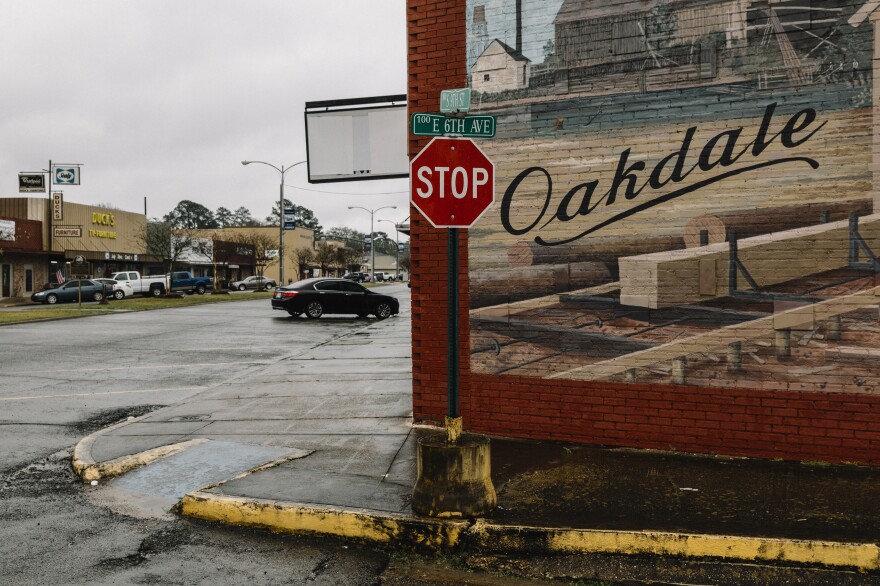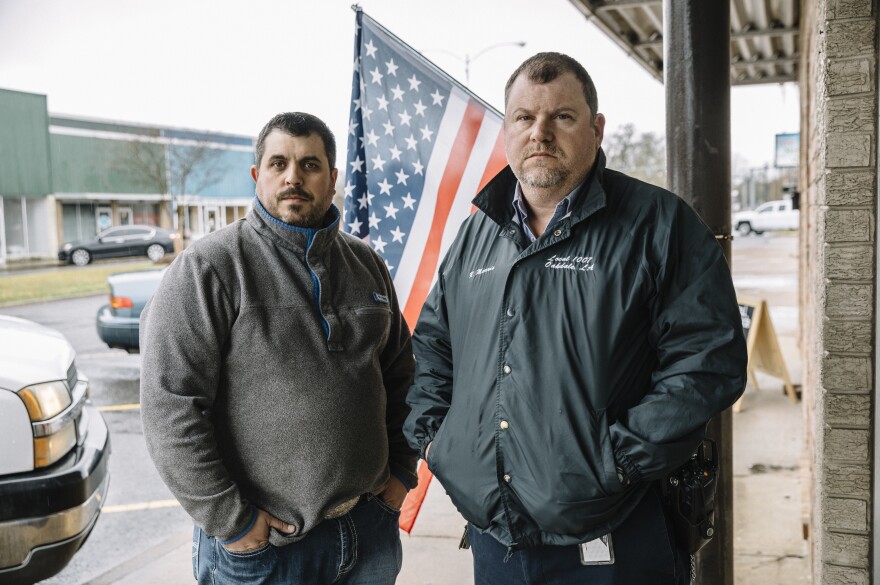For government workers who haven't been paid in more than a month, the shutdown is feeling increasingly dire. Savings are drying up; bills are coming due.
The people of Oakdale, La., are among those feeling the pressure. The city of about 8,000 is in the middle of the state — more than three hours' drive from New Orleans or Houston.

A federal prison there was one of the most reliable employers, providing good salaries and benefits. The typical family in Oakdale has an income of about $30,000 a year. The starting salary at the prison is about $35,000.
Now, many of the roughly 400 people employed by the Oakdale Federal Correctional Complex are facing extreme decisions about how to keep their families afloat — with effects that are rippling throughout the community.
Tiffany Kirklin and her husband, James (shown above with their daughters, from left, Abbie, 7, Mandi, 12, and Natalee, 9), have both worked at the Oakdale Federal Correctional Institution for five years. Now, they're still working 40 hours a week, without pay, and James has taken a second job at a convenience store.
"It makes your self-worth go down when you can't support your own self," James says. "Especially when you're used to having two government incomes, and you have nothing."
Tiffany has spent hours on the phone with creditors, asking to delay car payments, insurance payments. She canceled the cable. In their kitchen, the deep freezer is mostly empty.
"The other day we were in the grocery store and ... Natalee asked for something. I just kind of broke down in the grocery store because we've never not had money for extra food," Tiffany says. "Now we might not have had the extra money to go bowling, but we've never not had the extra money. I've never deprived my kids of food."
"The longer it goes, it's kind of like the light's dimming," says James. "Most people can see the light at the end of the tunnel. The light's going away for us, because it doesn't seem like it's going to get any better."

Corey Trammel (left) is president of the American Federation of Government Employees Local 3957. Ronald Morris is president of AFGE Local 1007. It's the union that represents the local prison workers.
"I've thought of a whole lot that could go wrong in a prison setting, but never to have an employee look me in the eyes and tell me, 'I cannot afford child care; I cannot afford gas to get to work; I can't afford my mortgage,' " Trammel says. "How do you answer something like that?"


There are many things people aren't able to afford anymore — even special, discounted $5 meals at Burger Inn, the fast-food restaurant in Oakdale that the family of Megan Crawford (above) has operated for 14 years.
The restaurant's business has fallen off dramatically since the shutdown.
"It affects us as a business down to our employees. We're cutting hours of our employees, cutting workers altogether because we're not having the influx," Crawford says.


Even the office of Oakdale Mayor Gene Paul (above) is feeling the pain. The executive assistant is married to a prison employee who is working without pay. The mayor's own wife is one of the government workers not getting a salary right now.
The end of the month is approaching and people's bills are due. At least this is one place Paul says the city can help: He has vowed not to cut water or sewer services for anyone who can't pay.
And even when this crisis is over, the mayor says, there's a bigger fear.
"It's a long-term insecurity," he says. "Because you don't know what's gonna happen a year from now — they gonna play with me next year?"


Maureen Pao adapted this story for the Web. Dave Blanchard, Gus Contreras and Jolie Myers produced and edited the audio versions of this story.
Copyright 2023 NPR. To see more, visit https://www.npr.org.




